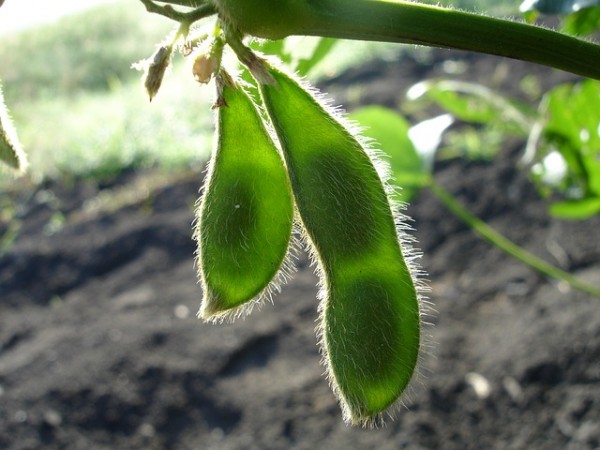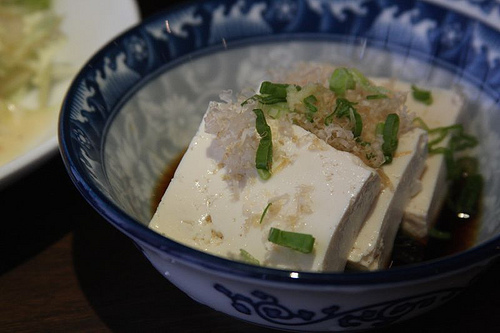
jcesar2015 / Pixabay
You may have seen some conflicting health news about soy and breast cancer.
- You shouldn’t eat soy if you’re at risk for breast cancer
- Soy can protect you against breast cancer
What should you do if you have breast cancer or are at risk for developing it? Is it ok to eat soy products? The answer appears to be yes, but with some caveats.
Like many things in life, the key is moderation says Dr. Tracey Weisberg, breast cancer specialist and lead physician at New England Cancer Specialists. Another key is how you eat soy. “If used as a nutritional source,” she says, “I would advocate for integrating it into the diet from natural and not genetically modified sources. Soy in tablets may be an issue.”
What is soy?
The soybean is a legume native to eastern Asia, where they’re often eaten whole. Here in America, we’re more likely to see a variety of soy products, some highly processed.
- Tofu
- Miso
- Tempeh
- Edamame
- Soy protein
- Soy sauce
- Soy milk
- Soy flour
Soy contains phyto or plant estrogens called isoflavones. These isoflavones are a group of chemicals found in plants that can act like the hormone estrogen. Dr. Renee Lang, a naturopathic doctor who specializes in integrative oncology at Wildwood Medicine, explains why, at one time, there was some concern about a possible link between soy and breast cancer. “Phytoestrogens have an ability to bind to estrogen receptors in the body,” she says. “Given that breast cancer is often, although not always, hormone positive, it will respond to estrogen. Because estrogen may increase the growth of breast cancer cells, there was concern that phytoestrogens might contribute to cancer growth or cancer development.”
What the research shows
Dr. Lang says preliminary research in the lab suggested that soy might stimulate cancer cells. “If that was the only information we had available for us to make a decision,” she says, “then yes, we’ll say don’t eat soy. Don’t eat it if you have a history of breast cancer, especially hormone positive breast cancer because maybe it will stimulate it.”
So far, research has not borne out that theory.The next round of studies observed women in Asia, where, unlike America, soy is a normal part of the diet. Scientists looked at Asian women with a history of breast cancer who ate soy. Were there more instances of recurrence in women who eat more soy? Was there a worse prognosis or outcome in women with breast cancer who continued to eat soy through treatment? “The data showed that no, that wasn’t going on,” says Dr. Lang. “Soy wasn’t increasing recurrence of cancer, nor was it increasing or contributing to a worse prognosis.”
Studies of Caucasian women in Europe and America have shown similar results. “In tissue culture models it takes an abundance of a plant product to activate a mammalian receptor,” says Dr. Weisberg. “It has always been irrational to me that claims that natural foods comprised of soy (I am not referring to preservatives) could be detrimental to women with or at risk to develop breast cancer. It would take a wagon load of soy per day to stimulate the estrogen receptor.”
Further studies looking at soy/phytoestrogens and breast cancer are ongoing. Aside from the estrogen question, some of the research suggests soy may have some protective effects. “It’s anti-inflammatory,” says Dr. Lang, “and may be an antioxidant. It’s also a very lean form of protein and one of the few forms of protein that have fiber. Nutritionally, it’s really a good choice when discussing diet and diet choices after a cancer diagnosis for staying healthy and making choices to prevent recurrence.”
A recipe
If you’re interested in adding soy to your diet, here is a recipe for Marinated Tofu Stir Fry from Meg Wolff’s cookbook A Life in Balance.
Marinated Tofu Stir Fry
4-6 servings
Ingredients
1 pound tofu
1/2 cup onion, sliced
1 cup cabbage, shredded
1 cup carrots, sliced
1 cup broccoli, chopped
optional: add collards, mushrooms, or corn, as desired
4 to 6 cups cooked brown rice (noodles can be substituted)
Marinade ingredients
2 TBS mirin (Japanese rice wine found in health stores)
4 TBS soy sauce
1/4 to 1/2 cup water
pinch of sea salt
2 TBS rice syrup
1/4 cup fresh cilantro, chopped
2 TBS sesame oil
2 TBS toasted sesame seeds
2 TBS fresh ginger juice (grate ginger, squeeze out juice, discard pulp)
2 TBS ume or brown rice vinegar
2 green onions, thinly sliced
optional: pepper
Instructions
1. Combine all the marinade ingredients and marinate the tofu for at least 2 hours.
2. In a cast iron skillet over high heat, bring tofu and marinade to a boil.
3. Turn heat to low and saute for 2 to 3 minutes.
4. Cover and steam for 5 more minutes.
5. You may add a little more water if marinade cooks down.
6. Remove from skillet.
7. Put in a covered dish and set aside.
8. Saute the vegetables in sesame oil on medium high heat.
9. Add the salt and a little of the marinade.
10. Reduce heat to low, cover and simmer for 3 to 5 minutes.
To serve, layer rice (or noodles), then veggies and tofu on top.
Squeeze a small amount of ginger juice to taste.
Garnish with green onions.


Hi Diane,
Thank you for this article. Just last week an acquaintance told me to stay away from soy products because of a breast cancer risk. At first I was alarmed because I drink soy milk once a day, but then I remembered, “everything in moderation.” Thanks for the confirmation.
Betsy